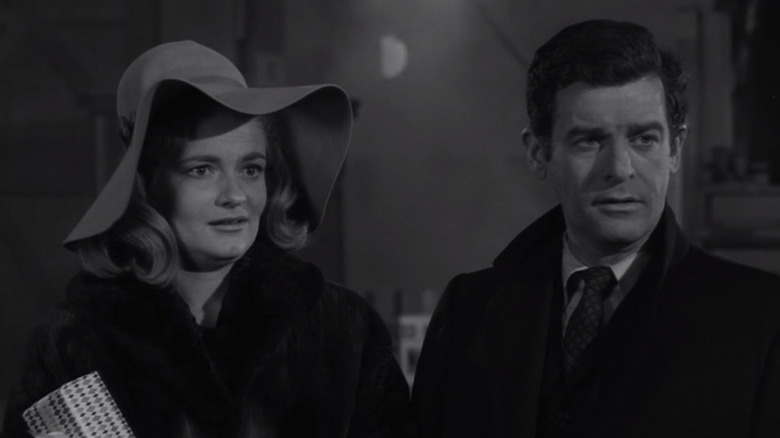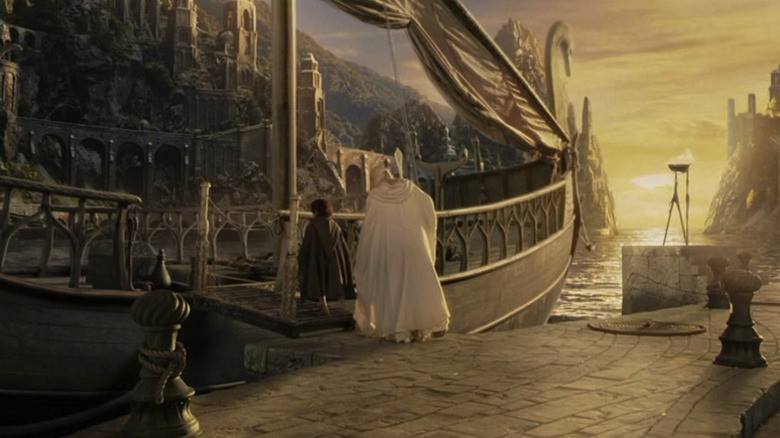One Twilight Zone Episode Has The Same Ending As The Lord Of The Rings: The Return Of The King
When CBS renewed the beloved anthology series "The Twilight Zone" for its fourth season, the network made the boneheaded decision of increasing each episode's runtime from about 30 minutes to around an hour. That upended the successful formula Rod Serling and his collaborators had landed on, resulting in the worst season of the original run. Still, despite the episodes losing some of their immediacy, there was plenty of room for Serling and company to explore fascinating ideas.
The 17th episode of the season, "Passage on the Lady Anne," has a ton on its mind. The story follows a couple, Eileen (Joyce Van Patten) and Alan Ransome (Lee Philips), who have been married for six years but have lost the spark in their relationship. Eileen convinces Alan that she should accompany him on a business trip from New York to London so they can spend some time together and potentially save their relationship, and they ultimately decide to travel across the ocean on an old ship called the Lady Anne.
After they depart, the couple realizes something strange: All of the other passengers on the ship are elderly. The episode's central twist is reminiscent of the ending of J.R.R. Tolkien's "The Lord of the Rings: The Return of the King," and, of course, Peter Jackson's Oscar-winning film adaptation of that tale. As we discover in the episode, the Lady Anne is actually going on its final voyage — to the afterlife.
The Twilight Zone's Passage of the Lady Anne and The Return of the King share a thematic conclusion
There are several hints about the ship's final destination early in the episode, including a huge giveaway at the halfway point that's essentially hand-waved away, but the truth becomes clear at the end. Alan and Eileen's relationship is severely fractured — Alan values his work more than his wife — culminating in a nasty fight they have at the ship's bar, where they decide to break up as soon as they come into port. Eventually, Alan has a Scrooge-esque revelation that he's been prioritizing the wrong things in life, and the two reconcile. Along the way, one of the ship's passengers slips in some commentary about how the modern world is leaving his generation behind. It seems as if the episode itself might adopt that character's bitter outlook, but the aging passengers end up rejecting those ideals by putting the young Alan and Eileen on a lifeboat and setting them free before the boat sails into oblivion. They know their time is up, but they also know they can leave the world a better place than they found it by leaving the innocent behind.
At the end of "The Return of the King," hobbits Frodo, Sam, Merry, and Pippin travel to the Grey Havens to see Frodo's uncle, Bilbo Baggins, off on his journey to what is essentially the afterlife. In the heartbreaking final moments, Frodo reveals that he, too, will be taking that journey across the seas, leaving the innocent Sam — arguably the true hero of the entire "Lord of the Rings" saga — behind to help rebuild a broken world.
The notion of a ship that sails into the afterlife has been a staple of various mythologies dating back to the ancient Egyptians, whose sun god, Ra, would sail across the skies in a boat carrying the sun and then travel to the afterlife at night. (The Egyptians even occasionally buried literal boats with the corpses of their royalty so that their resurrected kings could sail with Ra.) Later, the ancient Greeks would put money on the eyes of their dead to pay Charon, the sailor who would ferry the dead across the River Styx to the underworld. The scholarly Tolkien incorporated this trope into his own mythology, and "The Twilight Zone" used it to juxtapose a fading generation with new life breathed into the marriage of the central couple in "Passage of the Lady Anne."

